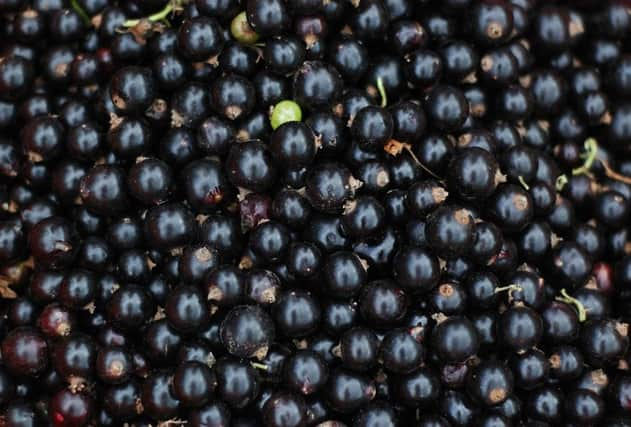Blackcurrants are a rare commodity so we must make the most of them


The demise of the pick your own fruit farms here mean you either grow your own fruit or source and support the few remaining farmers that allow you to harvest your own from their crops.
Last week the Salad Bowl Farm Shop in Queen Street, Coleraine, was awash with punnets of this treasured fruit. The fruit and vegetable section of supermarkets are full of scarlet strawberries, lush raspberries, shiny cherries and pristinely clean root vegetables, all encased in plastic.
Advertisement
Hide AdAdvertisement
Hide AdIn this local shop however punnets enjoy the freedom to allow their sweet scent free to fill the air. Carrots and beetroots, tops intact, are covered with clabber – the way nature intended! You’ll rarely find blackcurrants in supermarkets which is a shame. Apart from the fact they’re deliciously tasty, they have four times the vitamin C of oranges, the best antioxidant polyphenols and on top of this natural bounty they help maintain cardio vascular, brain and urinary tract health.
You’ll have no problem finding imported blueberries here but blackcurrants are a scarce commodity with a limited season. Ironically 95% of the British and Irish harvest end up in Ribena, which is a pity as they’re such a national treasure and should be treated as such.
While they’re around, make them the star of the show. Simmer with sugar and combine with whipped cream and Clandeboye yoghurt to make a classic fool or create a classic pie with pears or apples. My first recipe this week is for a blackcurrant ripple cheesecake – zingy fruit swirled through creamy cheese with a hint of white chocolate and lemon. Blackcurrants and coconut are natural bedfellows and my other recipe is for a shortcake with the fruit layering the middle.
The recipe calls for the dough to be grated – no flaffing around rolling pastry out. Eat warm with icecream or cool and serve as a tray bake – equally good either way.
Advertisement
Hide AdAdvertisement
Hide AdIf you’re lucky enough to get your hands on some local blackcurrants you’ll want to save them for the winter months. The easiest way is to freeze them in bags but there are other more interesting methods of storing them. Because of their high natural pectin levels, they’re ideal for jam making.
Take 250g of fruit, combined with 250g granulated sugar, 200ml of water and the juice of a lemon is the right ratio to go by. Simmer for 15 minutes then boil rapidly until the mixture reaches set point – 105oc on a thermometer or when a drop placed on a cold saucer sets. For added impact you could substitute some of the water for whiskey or gin and add aromatics like star anise, lime or ginger. For me though this is definitely a lily that doesn’t need gilded.
You could take a leaf out of Ribena’s book and make a cordial. Place a kilo of blackcurrants in a pan with 500g sugar and 500ml of water and simmer for five minutes. Blend up and add a teaspoon of citric acid. Simmer for another five minutes and strain through muslin. Pour into sterilized bottles and store in the fridge.
The French fruit liqueur Crème De Cassis is a decadent way of using the fruit but it takes time and requires patience. Wash a kilo of blackcurrants and place in a kilner jar. Pour in 750ml of vodka, seal and leave for three months. Blend the whole thing and pass through a fine sieve. Boil 150ml of water with 300g sugar to a syrup and mix with the vodka mixture. Pour back into the jar and leave for two months until drinking – if you do it now you could have Kir Royales on Christmas morning! The resultant reward is well worth the effort.
Forget about silly goji berries and flippant blueberries – local blackcurrants are where the taste is and not to celebrate them is missing a succulent trick!